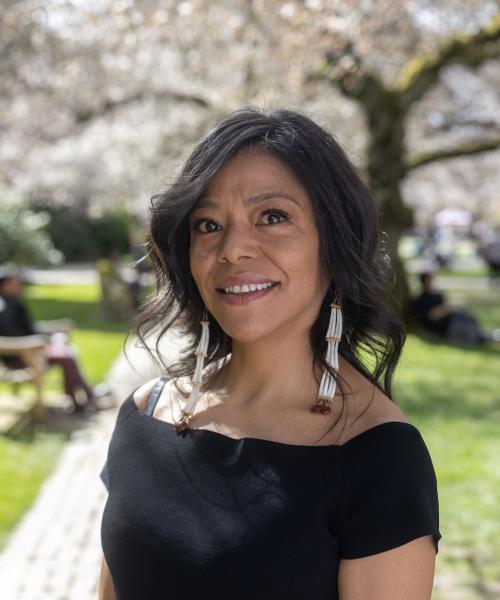
Additional Appointments
Affiliate Faculty, Banks Center for Educational Justice
Research Interests
Emma Elliott
Dr. Elliott (Cowichan Tribes) is an assistant professor in the Department of Learning Sciences and Human Development in the College of Education at the University of Washington. She holds both a Ph.D. in Educational Psychology and a Master of Social Work in Children, Youth, and Families. The interdisciplinary intersections of her research include culture, learning, and human development; land-based and Indigenous methodologies; and trauma, prevention, and recovery among Indigenous children and youth. By employing a strengths-based approach to healing, Dr. Elliott rigorously engages youth, families, and communities in the development of integrated educational and behavioral health interventions to address social issues. Her research centers ethical frameworks generated by Indigenous and land-based knowledges and practices to create process-centered approaches that illuminate Indigenous pathways toward collective livelihood. Dr. Elliott is currently partnering with members of the Cowichan Tribes to design programming to strengthen the physical, mental, intellectual, and cultural health of the community.
San Pedro, T. & Elliott, E. (forthcoming). Beyond Qualitative Interviews: Toward Synergistic Conversations as Relational and Nation Building (Edited book chapter).
San Pedro, T. & Elliott, E. (forthcoming). Centering Relationships in Research: Storying as Methodology. In Winn, M. T., & Lawrence, W. T. (Editor in Chief) and Montano, E. & Martinez, D. (Volume Editors), The Bloomsbury Encyclopedia of Social Justice in Education. London, UK: Bloomsbury Publishing PLS.
Wexler, L, White, L., O’Keefe, V., Rasmus, S., Haro, E., Cwik, M., Barlow, A., Goklish, N., Elliott, E., Pearson, C., and Allen, J. (forthcoming). Centering Community Strengths and Resisting Structural Racism to Prevent Youth Suicide: Learning from American Indian and Alaska Native Communities. Archives of Suicide Research.
Ullrich J., Demientieff L, & Elliott, E. (2022). Storying and re-storying: Co-creating Indigenous well-being through Relational Knowledge Exchange. American Review of Canadian Studies, 52 (3), 247-259.
Elliott-Groves, E. & Meixi (2022). Why and how communities learn by observing and pitching in: Indigenous axiologies and ethical commitments in LOPI (Cómo y porqué las comunidades Aprenden po rmedio de Observary Acomedirse axiologías indígenas y compromisos éticos en el modelo LOPI), Journal for the Study of Education and Development (Infancia y Aprendizaje), [Special Issue] Learning by Observing and Pitching In to Family and Community Endeavors. doi:10.1080/02103702.2022.2062916
Meixi, Moreno-Dulcey, F., Alcalá, L., Keyser Ohrt, U., & Elliott-Groves, E. (2022). When Learning is Life-giving: Re-designing Schools with Indigenous Systems of Relationality. American Educational Research Association Open (AERA), 8, doi.org/10.1177/23328584211062587
Jansen, K., Shaw, J., Comtois, K. A., Elliott-Groves, E., Slaney, T., Avey, J., & Nelson, L. & The CARE Phase 1 Study Team (2021). Culturally Adapting Caring Contacts for Suicide Prevention in Four Alaska Native and American Indian communities. Archives of Suicide Research. doi:10.1080/13811118.2021.1967820
McCoy, M., Elliott-Groves, E., Sabzalian, L., & Bang, M. (2020). Restoring Indigenous systems of relationality. [Invited Testimony]. Center for Humans and Nature. Libertyville, Illinois. https://www.humansandnature.org/restoring-indigenous-systems-of-relationality
Elliott-Groves, E., Hardison-Stevens, D., & Ullrich, J. (2020). Indigenous Relationality is the Heartbeat of Indigenous Existence during COVID-19. [Special issue]. Journal of Indigenous Social Development, Indigenous Communities and COVID-19: Impact and Implications, 9 (3), 158-169.
Henne–Ochoa, R., Elliott–Groves, E., Meek, B. A., & Rogoff, B. (2020). Pathways Forward for Indigenous Language Reclamation: Engaging Indigenous Epistemology and Learning by Observing and Pitching in to Family and Community Endeavors. The Modern Language Journal, 104 (2), 481-493.
Elliott-Groves, E. (2019). A Culturally Grounded Biopsychosocial Assessment Utilizing Indigenous Ways of Knowing with the Cowichan Tribes. [Special issue]. Journal of Ethnic & Cultural Diversity in Social Work, Advances in Social Work Practice with Multicultural Communities, 17 (4), 115-133.
*Elliott-Groves, E. & Fryberg, S. (2018). “A future denied” for 21st century Indigenous youth: Reclaiming the future. [Handbook Chapter]. Handbook of Indigenous Education. (Eds. McKinley, E. & Smith, L.T.). Springer, Singapore. https://doi.org/10.1007/978-981-10-1839-8_50-1
Elliott-Groves, E. (2018). Insights from Cowichan: A Hybrid Approach to Understanding Suicide in One First Nations’ Collective. Suicide and Life-Threatening Behavior, 48 (3), 328-339. doi.org/10.1111/sltb.12364
